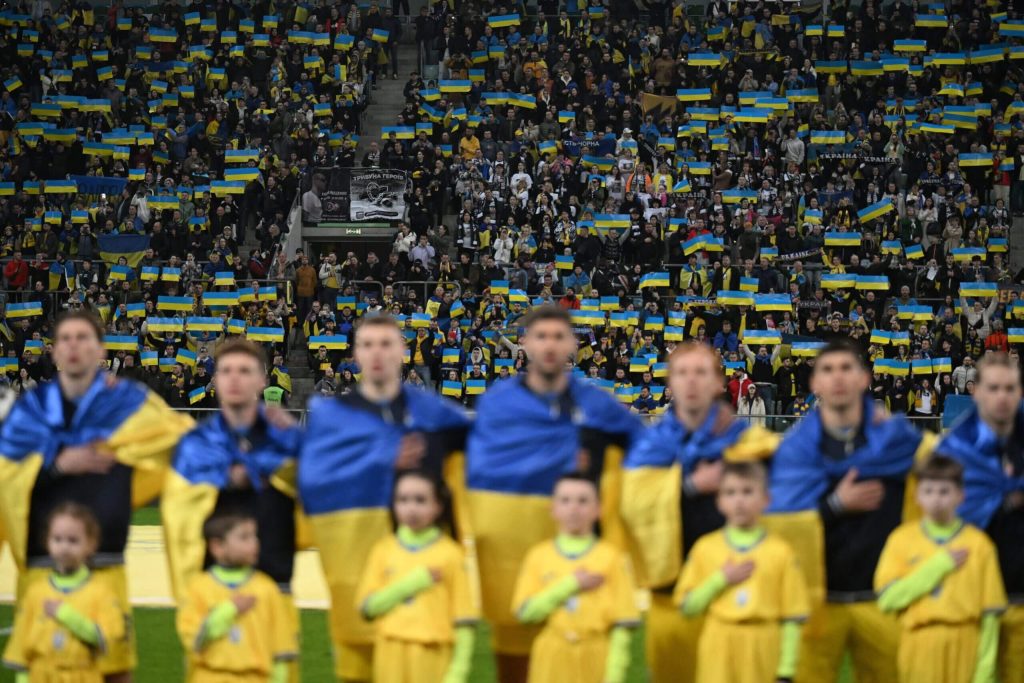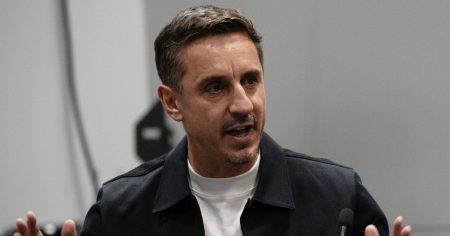More than 40 members of Ukraine’s national team celebrated their Euro 2024 play-off final win at Wroclaw’s Tarczynski Arena with a version of the Viking thunderclap, despite their country’s struggles with a Russian invasion and displacement of millions. Led by Chelsea forward Mykhailo Mudryk’s late goal, the team defeated Iceland to secure their spot at the Euros, a feat they had failed to achieve two years prior. The win was not just a footballing triumph but a symbol of resilience and unity for a nation torn by war and conflict.
The presence of Ukrainian supporters, draped in blue and yellow flags, highlighted the importance of this victory beyond football. Families and friends, separated by borders and war, shared the emotional moment through video calls and celebrations in Wroclaw, a city transformed into a ‘Little Kyiv’ for the occasion. The play-off final was a poignant reminder of the challenges faced by Ukrainians, both at home and in exile, and the significance of this sporting achievement in the midst of their ongoing struggle for independence.
The diaspora of Ukrainians living in Europe played a significant role in supporting the national team, showcasing their patriotism and solidarity with their homeland. Players like Viktor Tsygankov and Mykhailo Mudryk, based abroad, combined with a diverse fan base to bring Ukraine into the spotlight at the upcoming tournament in Germany. The team’s captain, Oleksandr Zinchenko, emphasized the emotional significance of the win, acknowledging the support and motivation they received from Ukrainians worldwide.
Despite being favorites in the play-off final against Iceland, Ukraine’s players faced the mental burden of knowing their family members were enduring life in a war zone. The domestic league had suffered due to the conflict, with many players unable to compete for months before the play-offs. However, the team’s success served as a source of inspiration for Ukrainians everywhere, reinforcing the nation’s spirit of resilience and determination in the face of adversity.
The scenes of Ukrainian soldiers watching the match in the trenches, and the messages of support from military personnel and civilians, highlighted the deep connection between football, national pride, and the ongoing conflict. Fans like Artem Genne, living abroad but deeply involved in supporting their country, showed unwavering dedication to their homeland and its struggle for peace and prosperity. The upcoming Euros offer a platform for Ukraine to showcase its unity and strength to the world, bringing hope and happiness to a nation in turmoil.
For many Ukrainians living in exile or near the border, the play-off win had a profound impact, symbolizing a moment of respite and joy amid the ongoing conflict. Families like Roman Labunski’s, who traveled from Berlin to be at the game, found solace and hope in the team’s success, despite their personal connections to the war-torn region. The tournament in Germany represents an opportunity for Ukraine to display its identity and resilience on a global stage, reminding the world of their ongoing struggle and unwavering spirit.















